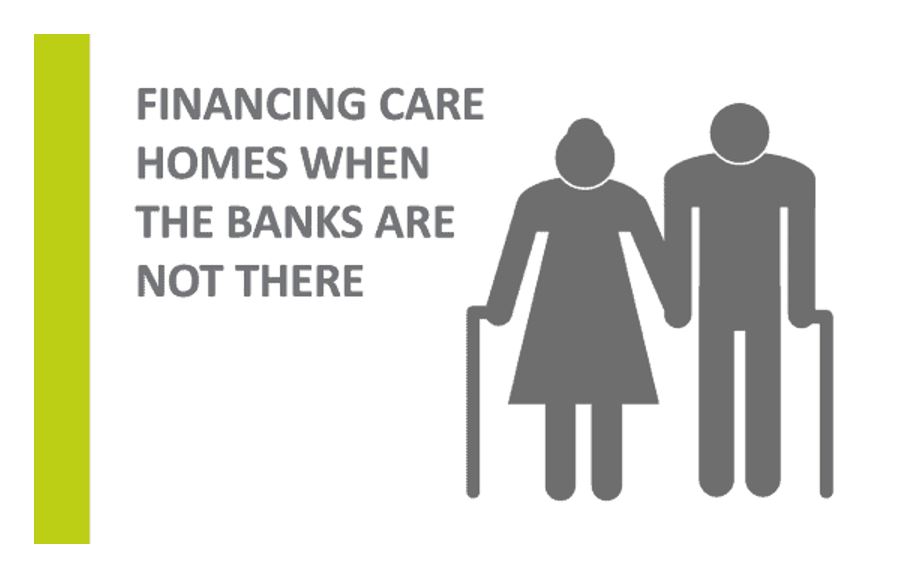With the economy and real estate market of London strengthening, Fiduciam is putting additional efforts into its lending to London-based entrepreneurs and SMEs. Fiduciam is well known for its ability to offer solutions where banks are unwilling, as is demonstrated with an example in the article.
Care home bridging loans: supporting SMEs when they need it the most

Here at Fiduciam, we lend on care home assets when the underlying business model is strong, where experienced management is in place, but often due to special situations high street banks have vacated the playing field. Often these SMEs find it difficult to finance their expansion or are abandoned in times of short-term operational or financial difficulties, even though the issues faced by the business are generally resolvable in the medium-term. Fiduciam will take the time to analyse the business plan to determine how an expansion can best be financed. Equally Fiduciam will take the time to understand any underlying issues and endeavour to provide the business the short-term liquidity required to bridge their way back to sustained growth. Put simply, through our short-term finance, experienced entrepreneurs are able to grow and protect the equity which they often have built up over many years.
For example, Fiduciam was approached to refinance a loan a family-owned care home group had with a high street lender which was seeking to foreclose the loan despite the business still being in profit. A 24-month bridging loan from Fiduciam allowed the care home group to rectify their issues with the Care Quality Commission (CQC), improve their profitability and then, in fact, re-finance with a bank at lower interest rate after only c. 12 months. If the previous high street lender had proceeded to sale by administrators, the principals would have lost c. £8m in equity built up over twenty years of trading. Furthermore, by keeping the care homes operating, numerous jobs were saved and much-needed patient beds maintained.
Fiduciam also provides care home bridging loans in other situations where high street banks have limited appetite. Our team will work with borrowers who are expanding an existing care home or seeking to establish or acquire a business. Individuals experienced at operating care homes can approach us to fund their new projects, even if the borrowing entity does not have an established trading record. Fiduciam would also lend against a care home asset when the borrower is not the operator but has a formal lease in place with an experienced care home operator. Our care home finance is available to borrowers throughout the UK, including Scotland, and throughout Ireland.
From an underwriting perspective, there are several unique risk factors we consider when conducting our credit due diligence on a specialist care home asset:
Experience of UBO / Care Home Manager
One of the key elements we look at is experience of the underlying principal(s) of the transaction in the highly specialised care home sector. If the principal does not manage day-to-day operations, we also carry out due diligence on the care home manager to ensure he or she has the relevant experience to run a care home successfully.
We have seen many examples in which a care home business runs into financial difficulty because of operational mismanagement of the care home, which in turn leads to problems with the regulator – the Care Quality Commission (CQC).
Care Quality Commission (CQC)
CQC regulates all health and social care services in England, which also includes care homes. A common breach in covenants for a care home business with their high street banks is the downgrading of their CQC rating, which range from “outstanding” to “inadequate”. If, after a site inspection by CQC, the care home gets downgraded to “inadequate” then potentially they will not be able to enrol new patients to the care home. Naturally this will have a material and adverse impact on their cash flow / profitability.
Fiduciam is happy to support care home businesses where they run into short-term difficulties with CQC but have a plausible and detailed strategy / plan to improve their CQC rating; we will take the time to understand the proposed strategy and work closely with all parties to ensure this is achieved during the term of the loan.
Vacant Possession Value vs Open Market Value
Fiduciam will lend against the trading or Open Market Value (OMV) of a care home asset, but given we are a short-term asset lender, we still need to ensure we are comfortable with the vacant possession (VP) value and not just the OMV value of the care home asset.
Given the above, Fiduciam generally prefers lending to care home assets where they are located in good areas where this is a proven demand for properties.
Cash flow – Capital Expenditure (CAPEX)
Given the specialist nature of care homes, they will tend to have a significant annual capital expenditure (CAPEX) requirement which needs to be factored into the overall cash commitments (compared to say a standard residential property); Fiduciam will always carry out due diligence on what the CAPEX requirements are for a care home business to ensure it is realistic and sufficient to ensure it continues to be compliant with the CQC.
As a broader point, Fiduciam will also carry out in-dept due diligence on the cash flow of the care home to ensure it is sufficient to service the debt over the term of the loan.
Supply side risk of quality staff
The potential impact of labour market shortages on staff supply (and consequential use of agency staff) in the care home sector is a risk factor that Fiduciam will always assess by evaluating whether the borrower is recruiting and retaining staff of the right quality, and also to understand how they incentivise their staff to stay.
Given the highly regulated nature of care homes, we would also check whether there are formal training plans in place for all staff.
Generally speaking, if there is a heavy reliance on agency staff and we note that this is a high percentage of the overall staff payroll expense, then we would consider this as a material adverse warning sign. Use of agency staff tends to add significant extra cost to a P&L, and by itself has been known to make a care home financially unviable.
Concluding notes
Our care home bridging loans are in strong demand in the care home sector and generally serve to finance acquisitions, refurbishments, expansion plans and corporate turnarounds. Our specialized underwriting team has built up extensive experience in this area. All our care home loans have performed well, which is also thanks to Fiduciam’s practice of developing a productive relationship with the care home operators during the term of the loan.
Fiduciam aims for €100m in Spanish bridging loans in 2020
Following a very successful 2019 during which Fiduciam lent nearly €80 million into Spain, Fiduciam’s Spanish team explains how it is conquering Spain with its bridging loan solutions, from Catalonia to Andalusia and from the Canary to the Balearic Islands. More than tripling the amount in loans granted from 2018 to 2019, it aims to reach €100 million this year.













